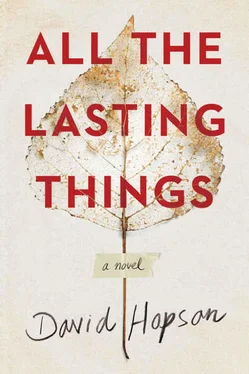Max turned sleepily on his side, snuggling into the couch as Navi stood and tried to pull him to standing.
“You can’t sleep here,” Arnav said with a note of parental reproof.
If only Max could hold on to that delicate thread of sound, that shadow of a song that made a stitch under all the other noise.
Benji squeezed Max’s foot. Then, seeing no movement, convincing Arnav to let him be, threw a blanket over him.
Max’s mind moved heavily, slow with liquor, but suddenly there, with the music, was this:
With her foot on the threshold she waited a moment longer in a scene which was vanishing even as she looked, and then —something, something— it changed, it shaped itself differently; it had become, she knew, giving one last look at it over her shoulder, already the past.
To the Lighthouse. Cat had given a copy to Benji when Benji was in the hospital, and Benji in turn had given it to Max. A book about an artist finding her vision, Benji explained, for an artist about to find his vision. Max had read it twice, devoured it on the plane ride home, committed passages to memory, so the words he wanted now, the sweet and pitiful lament of Mrs. Ramsay as her own party came to an end, came readily to hand.
His family moved around him, clicking off lamps, gathering bags from the front hall, the loud, communal march up the stairs. Max didn’t move, trying to make out the sound that played below the roiling surface of their laughter. He lay as still as he could, trying to hear it. A few scattered notes. At first, he thought he recognized it as something they had sung earlier that evening, a snippet of Paul’s tribute to Billie Holiday twisted into another shape, but the closer he listened, the more certain he was that the notes were new. The notes were his. He didn’t know them. He wasn’t hearing them again. They’d scattered through his mind like startled birds as he crunched over the frosted grass and now, finally — thanks to Cat’s passing observation, thanks to his memory of Mrs. Ramsay bidding the night good night — they shaped themselves into a formation that sang out to him as it moved across the blank calm of the room. The phrase came to him for the first time, yet it was instantly familiar. It repeated itself. It formed like a silver-crested wave, swelling, swelling, before it folded in on itself and shattered, as on rocks, into silence. It was water moving against the shore. He kept his eyes closed and played the notes again. They were louder, more confident, drowning out the sound of footsteps overhead, over Benji’s stage-whispered promise to see them all in the morning, over Claudia (still in the room) softly saying his name. Here, at last, she was. Too late. At least for the night, too late. He pretended she wasn’t there.
“Max,” she said, approaching, closer, closer, until he could smell the toothpaste on her breath. She touched his arm with the lightest touch. “Max?”
The wave crashed and ended, not with silence this time, but with another sequence. The sound twisted and surged and leapt. Before him, Max saw a light switch on in the darkness, a lighthouse whose beam illuminated a boy cutting images from an illustrated magazine. It was James. The notes were James, springing sprightly, the bounding leap he would make if only he could get to the lighthouse. If only the weather were fine. If only — and here the theme was interrupted by a dark, heavy throb of Mr. Ramsay’s oppressive paternal shadow passing by.
Max heard the opening pages of the book. He was rewriting the opening pages of the book, translating them into the language of percussion and woodwinds and strings. He had to get up. He had to write it down. He had to be still so Claudia wouldn’t disturb him, because Claudia would be there tomorrow and the music, perhaps, would not. He felt the blanket being tucked more tightly around his chin, the sound of her giving up and slowly climbing the stairs. He ordered his body off the couch. He had to write this down. How would he remember if he didn’t write it down? But his muscles stayed beyond him. He called to her then, to Claudia, to Navi, but no voice came. I have to write it down, he cried as the song sank back into nothing. The silence of the house deafened him. He listened for the music’s return. I have to begin.
The Sibyl at Cumae
for Henry
I said yes
to it and now it spites me.
Life! One year for every crumb
of sand on the beach. You
show me how to build castles
so I can spend the ages sweeping them out.
My cake is marble, shawled
with cobwebs, candlelit like a nebula.
Not even your song can make me eat it.
The knifepoints of flame, hammered long
by the owled night, are enough
to dress and dry a rack of meat.
I will never be young again.
I don’t think I ever was.
Melt the silicate and wrap it round my husk.
I will fit. I grow smaller every year. I
belong on the shelf next to the lilac seeds,
a hull to rattle, a voice in a jar.
From: Claudia Fisher
Sent: November 24, 2012
To: Max Davis
Subject:
Dear Max:
Nothing I’ve said to you seems the right thing to say. Maybe there is no right thing. Or maybe there is, and here, hiding behind a computer screen, is the only way I can say it. I’ve started this message a hundred times and each time I delete it, thinking of another place to start. Maybe if I start here I’ll find the way. But this is me starting over, and look where I am.
My only words to you cannot be I’m sorry. I’m sorry is another wall to hide behind, and I’ve hidden enough in my life. When it comes to you and me, I did what I did because I thought it was right. I still think it was right. No matter how much hurt it caused. No matter how much of a mess I’ve made, I can see worse pain, a bigger mess with such clarity that my heart skips.
I’ve failed people I care about. You most of all. And yes, I do care. And yes, I could have failed you more. You tell me that you would have taken your chances. I won’t pretend to know your life with the Davises, but I look at you and do not see their fuckups, to borrow your phrase. You are a caring young man with a loving heart. You impress me deeply. There is your talent, but that is what the world sees. That’s not what I’m talking about. Your arms have been open so wide to me when I know I do not deserve it.
Part of me wishes you were more angry. I might know what to do with that. But your love? Love, sometimes, is the hardest to handle. It can bend us with its weight. I see giving you up through my mother’s eyes, and I have a hard time seeing my love in it. Even the words, her words: “giving you up.” In my mind, that’s not what I did. In my mind, I was protecting you. Safeguarding you. Loving you. And not only you, if I’m being honest, but me and Nick too. None of which makes me a hero. None of which, I hope, makes me a villain either. Do I regret? Yes. Somehow knowing that I did the right thing and feeling regret do not cancel each other out. Does any of this make sense? I feel like I’ve said nothing using all these words. They are a struggle to send.
Claudia
From: Max Davis
Sent: November 24, 2012
To: Claudia Fisher
Subject: Re:
Claudia—
I’m the age you were when you had me. If I had a kid today, what kind of parent would I be? Not a very good one, I guess. Navi & I talk about kids, but my dreams don’t have a baby in them, not yet, just like your dreams didn’t have a baby in them. Why would I blame you for that? I can’t say why did you choose your work over me when work is all I know. I try to understand. Maybe that’s why I’m not more angry. But I am angry. But I spent so much of my life feeling that way about everything — you & Amanda & being ground down by music when music was the one thing I could count on to lift me up. Anger isn’t what I want anymore. Plus, it’s harder to be angry when you understand. The more you look at a person, the more you understand them. Maybe I should be more understanding with my parents. What did they ever do to me that was so wrong? You said you were sure they did the best they could. Just like you did the best you could. But isn’t that what everybody says? Except the ones putting cigarettes out on their kids’ arms, but even they probably say they’re doing the best they can, which only means that most people’s best isn’t good enough. I’m not talking about you or Amanda specifically. I’m just saying. Do you know Philip Larkin? He’s a poet my boyfriend before Arnav introduced me to & he has this poem about how your parents fuck you up without even trying. Like it’s a contract or something you sign when you have a baby, saying you’re cool with basically wrecking another human being for life. I guess that’s what therapy’s for. Lol. Therapy & drugs & not the fun kind but the ones that screw with your mind until you can’t think straight. Sounds like I’m screwed either way. But I’m glad to hear that’s not the impression I make. I try to be a good person.
Читать дальше












